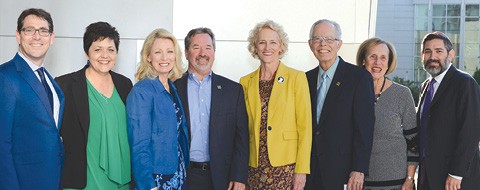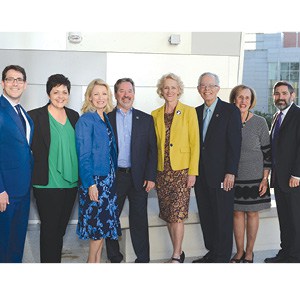
Jeff Cooper, JFS president; Kelly Burroughs, JFS CEO; Kathryn Barrett, moderator; Thom Hutchins, donor family; Dr. Janet S. Wright, acting director of Science & Policy, Office of the U.S. Surgeon General; Al Diaz, donor family and recipient; Patti Wainger, JFS board member; and Rabbi Jeffrey Arnowitz, Congregation Beth El.
The theme throughout the evening was awareness, but as the stories unfolded, an even stronger message came through: organ donation is LOVE.
The Thursday, May 16 program, “Organ Donation: The Gift of Life” featured keynote speaker Janet S. Wright, MD FACC, acting director of science and policy with the U.S. Surgeon General’s office, along with a panel of speakers at Zeiders American Dream Theater.
The annual Spring Into Healthy Living program presented by Jewish Family Service of Tidewater featured inspiring stories by donor families and donor recipients, as well as some eye-opening facts and dispelled myths from other speakers.
Kathryn Barrett, former medical editor with WVEC-TV, served as the event’s moderator. After the event, Barrett wrote, “It was impossible not to gain inspiration from the strength exuded by top-notch panelists who spoke about what the gift of life meant to them—giving it and receiving it—punctuated by thoughts from religious and medical leaders. As part of this outstanding program, I was surrounded by people that made me better, Wallace Green, Thom Hutchins, Al Diaz, Rabbi Jeffrey Arnowitz, Dr. David Baran, and Dr. Janet Wright.”
Dr. Wright told the audience about the initiatives of the Department of Health and Human Services related to organ and tissue donation. She outlined a plan for everyone to follow, which includes exercise, healthy diet, smoking cessation, and regular medical check-ups.
Only about 60 percent of Virginians are registered donors, although almost anyone age 13 and up can become a donor, either by registering at the DMV or online. Organs from one person can save up to eight lives, while a single tissue donor can enhance the lives of more than 75 people. Corneas can help others, as can blood vessels. Living donors, in which people donate an organ or part of an organ—kidneys and livers—to a person in need of a transplant, are additional avenues of organ donation.
Dr. David Baran, a transplant specialist with Sentara Heart Hospital, told of the incredible need for and success in the field of organ transplants. During the question and answer period, a young man stood up and shared that six months prior, Dr. Baran’s team gave him a new heart after he waited nine years for the transplant. His story and warm thanks to Baran left the audience with a real sense of hope.
Rabbi Jeffrey Arnowitz of Congregation Beth El, relayed the story of his cousin, Rebecca, who died waiting for a liver transplant. If there had been more registered organ donors, she may have lived. Rabbi Arnowitz has been a strong proponent of organ donation and an active advocate for LifeNet Health since moving to the area eight years ago. “The organization is first-class, and I’ve seen first-hand how delicately and carefully they handle the body,” he said. It’s Arnowitz’ mission to dispel the myths about organ and tissue donation, especially in the faith community. “The body has always been considered a sacred vessel for the soul,” said Arnowitz, “but contemporary leaders now see organ donation not as a desecration of that vessel but as a way to give life to another human being. And that is the most sacred Jewish tenet of all.”
Al Diaz spoke from the perspective as both a donor family member and as a recipient. His daughter, Maria, was tragically killed in a single car accident on her way to the University of Virginia in 2001. Maria helped 69 people with her tissue gifts. The gift of her corneas helped restore sight for two individuals and her heart valves, skin, bone, and connective tissue helped restore health for many others. “Organ transplantation saves lives and rightfully get the headlines because of the life-saving impact,” said Diaz, “but donated tissue also has a great impact on restoration of sight and health of many, many others.”
Diaz’s wife, Susie, had lung disease and died in February of 2018. Susie had been a proponent for donation and started a statewide program to help students going to the DMV for their driver’s licenses make informed decisions about registering as donors. She made presentations throughout the area to driver education classes, reaching more than 10,000 students. Diaz said, “When my wife died, she also became a tissue donor and helped restore sight to two lucky recipients and skin was also donated for use in reconstructive surgery, burn, and wound care.”
Diaz had dental implants in 2006 and 2009 using donor bone implanted in his jaw to strengthen it for an eventual implanted post and crown. He said, “Now my daughter, wife, and the individual who provided me donor bone for my implant did not die to donate, but because they did die and were generous, they all left a legacy to help others.”
Thom Hutchins’ son, Kyle, died at age 22. “All his life, he gave,” said Hutchins. An asthma sufferer, Kyle died from respiratory failure two years ago. Though he had not “checked the box” as an organ donor, Hutchins and his wife Melissa knew it was what Kyle would have wanted. In the end, his ultimate gift gave life—both kidneys, his liver, and his heart—to four different people. Because of Kyle, four people lived. The family has received letters of gratitude from each of the recipients, and those have helped them heal. Hutchins read excerpts from the letters, including one from a man who said that because of the transplant, he was doing well enough to travel to Florida to see his daughter get married. Hutchins concluded by saying that speaking on behalf of organ and tissue donation has been a big part of the grieving and healing process.
The evening’s final speaker, Wallace Green, touched on the guilt of being the recipient of a kidney. “I wrestled with thoughts such as ‘someone had to die so I could live,’” he said. “An eight-year-old girl died,” he said. “That’s hard to grapple with.” Eventually, he came to terms with the cycle of life, knowing that good has come from her gift. He has made it his life’s mission to spread the word about organ donation, in honor of the eight-year-old girl who changed his life.
Each speaker urged the audience to first, register as an organ donor, and second, spread the word and have conversations with family and friends about the importance of organ and tissue donation. More than 115,000 people in the U. S. are waiting for life-saving organ transplants, with 22 dying each day while waiting, according to Donate Life Virginia. In Virginia alone, nearly 2,600 people are waiting for organs, including about 2,000 just for kidneys.
For more information about organ donation, visit LifeNetHealth.org. To register as a donor, visit RegisterMe.org.
Organ Donation: The Gift of Life was presented by JFS in partnership with LifeNet Health (program sponsor), the Brock Institute of Eastern Virginia Medical School (EVMS), and WHRO. TowneBank was the Presenting Sponsor of the 15th Annual Spring Into Healthy Living. Michael Zeiders with Zeiders American Dream Theater graciously provided the evening’s venue.
Amy Cobb

